
Aditi Inamdar
She has worked as a child artist in the movie Poorna under Rahul Bose Productions.
A dreamer, a theatrist, an actor, a designer, a singer , a dancer, She loves to explore her artistic pursuits.
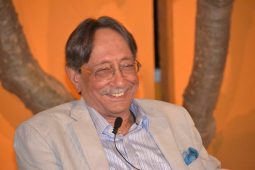
Amarjit Singh Dulat
AMARJIT SINGH DULAT served as the head of the Research and Analysis Wing (R&AW), India’s spy agency, under Prime Minister Atal Bihari Vajpayee. He later joined Vajpayee’s Prime Minister’s Office (PMO),where his job was to ‘monitor, manage and direct’ the government of India’s peace initiative in Kashmir.
Dulat was born in Sialkot, Punjab, in December 1940. With India’s Partition, his father, Justice Shamsher Singh Dulat, ICS, was posted to Delhi.Dulat was educated at Bishop Cotton School, Shimla, and Punjab University, Chandigarh, after which he joined the Indian Police Service (IPS) in 1965, and then the Intelligence Bureau (IB) in 1969 where he served for almost thirty years.
At IB he headed the Kashmir Group during the turbulent 1990s till he joined and headed
R&AW. Since leaving the government in 2004, he has been active on the track two circuit.
During service, he accumulated a vast reservoir of goodwill with Kashmiris of all shades. As Jane’s Intelligence Digest put it in 2001, ‘Well known for his social skills, Dulat prefers dialogue to clandestine manoeuvres’. Mr Dulat is now an author of two books Kashmir the Vajpayee Years with Aditya Sinha and The Spy Chronicles with General Asad Durrani and Aditya Sinha.
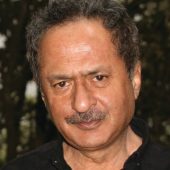
Anirudh Kala
Anirudh Kala lives in Ludhiana in Indian Punjab and is a psychiatrist by profession. His interests include lasting effects of the Partition on both sides of the border. He has been instrumental in cross border exchanges among mental health professionals of two parts of Punjab and some of stories in this collection are the result of visits to mental health institutes in Pakistan and interactions with colleagues there. He has published several stories.
“The Unsafe Asylum: Stories of Madness & Partition” is his first book of fiction.
He likes Urdu poetry, hiking and semi-classical Indian music.

Anirudha Bhattacharjee
Anirudha is a SAP consultant by profession and a musician by passion. A huge fan of Kishore Kumar, he loves revisiting football matches, films of Billy Wilder, Alfred Hitchcock, Satyajit Ray, Bimal Roy, Tarun Majumdar, Basu Chatterjee, Gulzar, et al, and a horde of comedies – from the awkwardly funny Crazy Boys series to childhood favourites featuring Terence Hill & Bud Spencer.
He writes only when he has a deadline.
He lives with his family in Bangalore, India
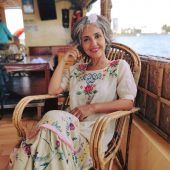
Anuja Chauhan
Anuja Chauhan is an author, screenwriter, columnist and advertising consultant. She has written several major ad campaigns – Pepsi’s Yeh Dil Maange More and Oye Bubbly, Mountain Dew’s Darr Ke Aage Jeet Hai, and Kurkure’s Tedha Hai Par Mera Hai. She has also written five bestselling novels – The Zoya Factor, Battle for Bittora, Those Pricey Thakur Girls, The House that BJ Built and Baaz. The Zoya Factor film, starring Dulquer Salman and Sonam Kapoor and produced by Foxstar Studios, will release on the 5th of April 2019. Anuja has written dialogue for the same. She is currently writing the screenplay for Baaz, the film, which is being produced by YashRaj Films. She is also contributing editor at The Week magazine. She lives outside Bangalore with her family and other animals.

Balaji Vittal
Balaji Vittal is the co-author of the bestseller “RD Burman: The man, The music”, (published by Harper Collins) which won the President’s Swarn Kamal Award for the Best book on Cinema at the National Film Awards for 2011. The media was effusive in its praise for the book for its detailing and the lucid story-telling style.
Next, Balaji Vittal co-authored “Gaata Rahe Mera Dil – 50 Classic Hindi Film songs” (published by Harper Collins) which won the Award for the Best Book on Cinema at the MAMI, the 17th Mumbai International Film festival in 2015. This book consists of 50 short stories replete with trivia, and behind-the-scene stories on the 50 landmark playback songs of Hindi cinema from 1936 to 1994.
A few weeks ago, the 3rd book co-authored by Balaji was launched – “SD Burman: The Prince-Musician” (published by Westland). This well-researched biography is both a tribute to the great artist SD Burman and a deep inquiry into what made his music great, by exploring hitherto unknown stories about the creation of each gem. Despite the fact that he was an outsider who spoke very little Hindi or Urdu, SD Burman was the one who introduced Sahir Ludhianvi to Hindi filmdom, and the one who gave Kishore Kumar’s musical brilliance its due. “SD Burman: The Prince-Musician” provides unmatched insight into his genius and a crucial aspect of its glorious cinematic history. The book is an essential addition to every film music aficionado’s library. The book has received very positive reviews from the media and enjoys a very high rating on Amazon. It was in the pre-order bestseller’s list at Amazon.
From 2007 onwards Balaji has been a freelancer with The Metroplus and Young World (The Hindu) contributing articles around trends, events, fashion and celebrity interviews. And then the big break came when he co-authored the three books mentioned above Balaji was selected as a Jury Member to judge the Best Book on Cinema at the 2013 National Film Awards. Balaji contributes to Metroplus with the fortnightly column “Bollywood Lost & Found” .
He is married to Vandana and they have two children Ashapoorna (21) and Akhilesh (15). The family along with Balaji’s mother is based at Hyderabad. Balaji works in Bangalore and keeps shuttling between the two cities.
Balaji is also a public speaker and a talk-show host too and he has been invited to perform and speak at prestigious events like Hyderabad Literary Fest (2014), Chandigarh Literary Society Meet (2014), Kolkata Literary Meets (2013, 2016, 2017 and 2018) and Chennai Lit for Life. Balaji Vittal has also been invited to perform live infotainment retro Hindi music shows at UAE, Singapore and London and various cities in India. Balaji was also invited to be the Jury Member at the National Film Awards in 2013.

Bikram Grewal
Bikram Grewal grew up in the dense evergreen forests of India’s North-east where he first developed his love for birds.
He attended the famous Lawrence School, Sanawar, the first educational institute to earn the King’s Colours in the British Empire. He studied Chinese History and the Mandarin Language in Delhi University. He also attended university in England and America.
Bikram Grewal made publishing his career and worked in England, Hong Kong and Singapore before returning to Delhi to set up operations for Dorling Kindersley. He was the Managing Director for Asia for over a decade. He gave up full-time publishing to devote his time to the conservation of Indian wildlife, especially working on rare birds.
He now serves as a trustee of several wildlife-based institutions and also acts as a consultant on eco-tourism to several Indian states. He is currently helping the Government of Nagaland, set up a five-year bio-diversity conservation programme.
He has written over 30 books on birds of the subcontinent. His other books cover diverse subjects diverse subjects, ranging from travel to the joys of collecting British natural-history art. He helped conceive the ‘birdsofindia’ website, which is now the biggest birding site in India and is ranked amongst the top ten birding sites in the world.
He is a trustee of the Wildlife Preservation Society of India (WPSI). He was awarded the Lifetime Award for spreading awareness about birds and conservation in India. He is also a full professor in IIT Kanpur. When not travelling, he spends his time between his farm in Dehradun, where he grows rare plants and his boat in the Sundarbans.
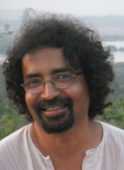
Desmond Nazareth
Desmond Nazareth is the principal founder and MD of Agave India, a company set up in 2007. Agave India is India’s first and only rurally based ‘greenfield’, small batch pot-still, ‘field-to-bottle’ and ‘forest-to-bottle’ craft distillery, using Indian know-how and raw materials. Desmond has been instrumental in formulating the notified 2018 pot-still based FSSAI alcohol manufacturing standards in India.
Agave India makes international quality Indian agave spirits, Indian sugar cane spirits and mahua spirits, as well as orange and mahua liqueur. Their products are sold under the master brand name, ‘DesmondJi’, or ‘DJ’, and some are being exported to the USA and Europe. The most recent products are DJ Mahua spirit and DJ Mahua liqueur, which were released in Goa in June, 2018.
Desmond is a successful serial entrepreneur, with international work and travel experience, in a variety of fields. He has been educated in pure and applied sciences, computer science and multimedia (B. Tech., IIT Madras, India; Masters in Computer Science / Film and TV production, Temple University, Philadelphia, USA). He grew up all over India, studied and worked for 17 years in the USA, moved back to Mumbai in 2000 and has been based in Goa since 2004.

Divya Dutta
Divya Dutta is an Indian actor who s done over 100 films including the likes of train to Pakistan, veerzara , dilli 6, bhaag milkha bhaag ,badlapur etc and won various awards like screen zee cine awards, iifa etc… she won the national award this year for her role in iraada.
Dutta is a columnist with tribune and her first book me and Ma has done exceptionally well.
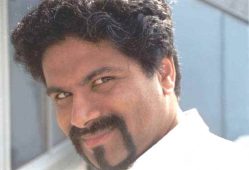
Dr Ian Magedera
Educated at the universities of Cambridge and London and author of Danigo! French Grammar Reorganized, Genet: Les Bonnes and Outsider Biographies on biographies of English and French-language writers who were also criminals, Ian Magedera is a would-be European who also blithely ticks the ‘British Asian’ box in ethnicity questionnaires. His cultural and academic travels in Europe, speaking German and French, follow on from his parents’ journeys to the UK in English and Sinhala just after the end of the British Empire.
Longer blurb from Amazon.co.uk author profile
Living at an intersection between English, French and German and teaching French culture, literature and language at university, has made me aware of the enriching potential of comparative perspectives. Knowing another can mean knowing oneself better. My publications use these perspectives to give my readers entertaining and perceptive analyses of the different ways in which speakers of English and French understand India, literary biography, French grammar and the works of Jean Genet. All my writing acknowledges individual subjectivity, be it of language learners, of writers with criminal records, of those colonized and the people who colonized them. These books also get to grips with how expressions of that individual subjectivity are challenged and problematized.
What happened to Sonia Gandhi as she moved from the Italian-born wife of the non-political son closer and closer to the centre of power? Before she became Mother Teresa, how did an Eastern European-born outsider in the Loreto order of nuns present herself as she claimed to renew Indian Christianity around 1947? How did Swiss-born Simone Tata apply the visits to Parisian beauty salons in her youth to transform Tata Group’s Lakmé brand? This is the ground covered by just three of this book’s ten chapters that illuminate the careers and Indian identity formation of European-born women and their deep and sometimes controversial influence on education, religions, spirituality, commerce and politics in India. That influence began with Annie Besant’s 1893 landfall in Tuticorin (Thoothukudi) and continues today<calendar:T5:today>, still enabled by Indian elites such as the Nehru-Gandhi dynasty, the Catholic Church and the Tata family. For their Indian supporters and opponents, these women were both Indian and videshinis (foreign women); they were also non-British (Italian, Albanian, Swiss, French, Ottoman Turkish and Irish) and thus at one remove from the colonial power. They may be the last outliers of the intercultural contact around empire and the freedom struggle, but their bumpy integration by Indians holds a lesson in inclusivity for the country’s future.
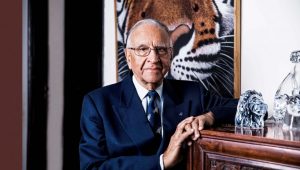
Dr. M.K. Raniitsinh
As Collector Mandla, from 1967 to 1970, responsible for the first efforts to save from extinction the Central Indian race of the barasingha (C.d. branderi) then down to just 66 animals. The first village ever to be translocated outside a national park in India was done by him during this period and showed the way for future translocations of human
population outside protected areas. It was at his instance that the Kanha Park was extended and the habitat better managed, as a result of which this race of the barasiilgha have now increased to over 400. As Deputy Secretary, Forests & Wildlife of the Government of India, drafted and piloted the Wildlife (Preservation) Act of 1972, the first comprehensive wildlife legislation applicable to the whole country and which has been the legal basis of wildlife conservation and for the establishment of national parks and scantuaries in the country and is responsible, to a great degree, for the progress made by India in this regard. Was Chairman of the committee appointed by the Minsitry of Environment & Forests to carry out a comprehensive review of this Act, and whose report was given in 1997. As the first Director of Wildlife Preservation of India under this Act, from 1973 to 1975, drafted the schemes for financial assistance to the States of India from the Central Government, for establishing national parks and sanctuaries. Was the first to make an aerial survey of the Keibul Lamjao Sanctuary, which showed the total population of the Manipur race of the brow-antlered deer to be just 14, the lowest wild population of any large mammalian taxa in the world then. Encouraged the upgradation of Keibul Lamj ao to a national park and other conservation measures, as a result of which the population has now increased to over 100 animals. When the Govt. of Kerala acquired the Eravikulam-Rajamallay area from a private tea estate in 1973 and was wishing to distribute the land, intervened and was responsible for it becoming a national park, now holding more than half the world’s population of the endangered Nilgiri tahr, as well as the highest peak in peninsular India and a premier tourist visitation area. As the Member Secretary of the Task Force for formulating Project Tiger, assisted in the identification of the first Tiger Reserves and the initaition of Project Tiger, the most ambitious and one of the most successful conservation projects in the world. Was responsible for the curtailment and the final ban of export of snakes and lizard skins, and of furs and rhesus monkeys. Was responsible for the launching of the successful captive breeding and rehabilitation programme for the 3 species of crocodilians in India, all three endangered, especially the gharial, and which have now been made safe in the wild. As Regional Adviser in Nature Conservation in the Bangkok Regional Office of the United Nation Environmental Programme (UNEP) during 1975-80, rendered technical advice in nature conservation, ecosystem management, legislation and international cooperation in this regard to the countries of the Asia and Pacific region, particularly to Thailand, Mongolia, Bhutan, Malaysia, India, Indonesia and Sri Lanka. As member of the
UNEPIIUCNIFAO team assisted in preparing the national conservation plan for Thailand. As the only Asian representative on the Expert Group, assisted the Government of Fedral Republic of Germany in preparation of the International Conservation of Migratory Species of Wildlife. Was the leader of the Team which drafted a conservation strategy for the Government of Bangladesh, and prepared the first drart of the cooperative environment programme (SACEP) for the South Asian countries. On return to India and during the tenure as Forest Secretary for the State of Madhya Pradesh, which has almost one-fourth of the forests of Ind.ia, was personally responsible
for the establishement of 8 new national parks and 1 1 wildlife sanctuaries, with a total area of almost 12,000 sq. kms. and extended the boundaries of 3 existing national parks and sanctuaries. Amongst the new protected areas was Van Vihar, a unique conservation effort within the precincts of the city of Bhopal, and three new protected areas to save the only surviving populations of the highly endangered Asiatic wild buffalo. Carried out a complete reorganisation of the Forest Department of the State and set it up in its present format, with an emphasis upon conservation rather than enhanced unsustainable exploitation. Also reorganised and upgraded the wildlife wing and assisted in the drafting, piloting and implementing a comprehensive legislation on the control of saw mills to prevent illegal exploitation of forests, the first of its kind in the country. Also formulated the state plan for wildlife tourism, in his dual capacity as Secretary Tourism, with emphasis upon conservation of wildlife through tourism, rather than its explitation. On his second tenure as Director of Wildlife Preservation for India from 1985 to 1989, and Member Secretary of the Indian Board for Wildlife, encouraged the State Governments to establish national parks and wildlife sanctuaries on bio-graphic and exosystem basis, and a number of new protected areas were established, especially in the Himalayas and in the Aildaman and Nicobar Islands, ultimately increasing to a total of over 500 countrywide. Was responsible for the amendment of the Wildlife (Protection) Act, 1972 and thereby totally banning the trade in endangered species in tbe country. Was responsible for the initiation of a project for the conservation of the snow leopard and its habitat on the lines of Project Tiger and for laying down norms for wild.life tourism. Piloted the final drafting and approval in Parliament of the present National Forest Policy of India.
As the nodal officer of the Govt. of India in charge of Wildlife Conservation, contributed towards the initiation and establishment of the Wildlife Institute of India and as the Chairman of its Research Advisory Committee, gave direction to its initial research programme. As the Director of the Ganga Project was responsible for initiating eco-friendly technologies for abatement of pollution like using trees as bio-pumps to deal with organic municipal sewage, conservation of aquatic life, particularly the endangered species like the Gangetic dolphin, and prepared the initial draft the National River Action Plan for the control of water pollution. Was Chairman of the Committee which prepared the initial draft of the proposed new Forest Act. As Chairman of the Standing Committee of Convention on International Trade in Endangered Species (CITES), Chairman of the Technical Committee of the First Conference of parties of the International Convention of Migratory Species of Wildlife, Regional Chariman of the Survival Service Commission of the International Union for the Conservation of Nature (IUCN) and as India’s Commissioner on the International Whaling Commission, has contributed very significantly to conservation in the International field. Has led the Indian delgation to the IUCN Conference in Canada and to the World National Parks Congress in the USA, and has visited and assisted national parks and other protected areas in over 70 countries. In his present capacity as Director and Regional Coordinator of the Tiger Conservation Programme of the World Wide Fund for Nature (WWF), he is providing infrastructmal and other support to tiger conservation, especially in those protected areas which has the potential but have languished for want of such inputs. Has started, with local NGOs and
with government approval, a scheme for the immediate compensation of cattle killed by tiger and leopard and its subsequent prevention from being piosoned, in areas where such poisoning is rampant, and a scheme to divert the tribals of Orissa from indulging in the highly destructive practice of Akhand Shikar. Was awarded by the Netherlands in 1979 the Order of the Golden Ark, in recognitioil of “outstanding work on behalf of International conservation both in India and in South East Asia,” and was elected to the Global 500 Roll of Honour of the United Nationas
Environment Programme (UNEP) “in recognition of outstanding practical achievements in the protection and improvement of the envrionrnent,” 199 1. Was the first recepient of the Maharaja Martand Singh Dev Trust Award for a lifetime’s contribution in the field of wildlife and environment conservation, 1996. In 1998 was awarded the Maharana Udai Singh of Mewar award for his contribution to the cause of environment. A subspecies of the Indian Barasingha, the eastern one found in Assam identified by the scientist Colin Groves in 1983, has been named cervus duvauceli ranjitsinhji in recognition of the nominee’s contribution to saving the central Indian barasingha only found in Kanha in Madhya Pradesh, and the Manipur brow-antlered deer, only confined to one place in
Manipur . It- was Dr. Ranjitsinh who brought to attention the impact of commercial exploitatioil of wildlife and prevailed upon government to alter the export policy by deleting endangered species to begin with, and subsequently to stop export and then stop trade in all wild.life. He was associated with CITES since its inception and was responsible for its initiation in India. Had he not brought attention to the predicament of the Manipur brow-antlered deer in 1975 and taken steps to protect it, it is very likely that this deer would have become extinct in the wild.
Similarly, it was at his initiative that the UNDP assisted Crocodile Project was launched and the 3 crocodialians, all of them at that time threatened, particularly the gharial and for whom there were no “god fathers” then as there were for the tiger, were saved. He also guided the initiation of Project Tiger and the selection of its original 9 sites, in his
capacity as Member Secretary of the Task Force for Project Tiger. As Forest Secretary to the Government of Madhya Pradesh, created more national parks and wildlife sanctuaries than perhaps any individual and saved for posterity not only the animate creatures, but diverse habitats of this largest Indian state with the largest forest area. His predication that nature, let alone wildlife has a future only in our protected areas, is painfully coming true. Has been awarded a Phd in Wildlife ecology for his research and treatise on the Indian blackbuck. Has published two authoritative books on the wildlife of South Asia and over 40 articles on wildlife, forests and nature, in books and journals, as short list of which is herewith appended. For the last 30 years, no other single individual has had such comprehensive and continuous impact on wildlife conservation in so many diverse fields, as Dr. Ranjitsinh. The Wildlife (Protection) Act of 1972, the conservation concepts he has enunciated, the schemes he has initiated and the protected areas he has created, will continue his work for years to come. Currently member of the National Board for Wildlife and its Standing Committee and Chairperson of the Wildlife Trust of India. Also the Chairman of the Ministry of Environment’s Task Force for the Reintroduction of the Cheetah in India, a proposal which was mooted by Dr. Ranjitsinh and has been approved by the Government of India. It plans to reintroduce Cheetah in its former habitat in India, where it became extinct soon after Independence, the only large mammal to go extinct in peninsular India in historic times .

Geeta Gopalakrishnan
Ms Geeta Gopalakrishan is the Honorary Director – Donor Relationships at the Tata Medical Center, Kolkata from the past 8 years.
With over 20 years of experience in advertising, she has been the ex-creative Director at Trikaya Grey and is also known for triggering Hinglish in advertising communication.
Geeta has been recipient of many awards across product categories including the campaign of the year award for Aristocrat Suitcases.
Throughout her professional life, which began at 19, she has worked for Sadhana School for Special Children in Mumbai as a labour of love.
She has very creatively used the power of advertising to raise the bar in fundraising for Sadhana School and now continues to do so for the treatment of underprivileged children with cancer at Tata Medical Center.
Her upbringing with both grandmothers helped her assimilate the wisdom of 10th century poet Avvaiyar and she has illustrated her 109 wide sayings with stories drawn down the ages to show how relevant they are to current day!
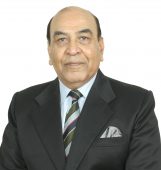
General Ata Hasnain
Through most of his 40 year illustrious career General Hasnain has served in turbulent environment and hot spots. From Sri Lanka to Siachen Glacier, from the North East to J&K and in UN operations from Mozambique to Rwanda, he has seen it all in crucial appointments. He served seven tours in J&K, in every rank, decorated in almost of them and knows the J&K conflict comprehensively. He commanded the Srinagar based 15 Corps and is today one of the foremost writers and analysts on J&K, Pakistan and transnational extremist violence. He is a much sought after speaker and writes for major Indian newspapers – The Times of India, The Indian Express, The Tribune, Deccan Chronicle and The Asian Age besides being a regular participant in television debates on mainstream television. With a strong academic background from Sherwood College, Nainital, St Stephen’s College, Delhi, the Royal College of Defence Studies and Kings College London, as also the Asia Pacific Centre for Security Studies, Hawaii, he has been at the forefront of encouraging the adoption of the Scholar Warrior concept in the Indian Army. Besides having spoken at the Bangladesh Institute of Strategic Studies (BISS), National Defence College (NDC) and Institute for Policy, Advocacy and Governance (IPAG), all at Dhaka, he also lectures at the Rajaratnam School for International Studies (RSIS), Institute of South Asian Studies (ISAS), and Lee Kwan Yu School for Public Policy, all at Singapore and is associated with the Vivekanand International Foundation as Distinguished Fellow and the Institute of Peace and Conflict Studies at New Delhi. He speaks on National Security at various civilian institutions and the corporate world with a view to enhance India’s strategic culture. On 13 Jul 2018 The President of India has appointed Lt Gen Hasnain as Chancellor of the Central University of Kashmir.
Gen Hasnain has six decorations awarded by the President for India and two by the Army Chief.
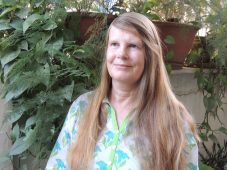
Gillian Wright
Gillian Wright is an author and translator based in New Delhi. She has worked with Mark Tully on all his books, and co-authoried with him ‘India in Slow Motion’. Her translations include Raag Darbari by Shrilal Shukla, A Village Divided by Rahi Masoom Reza and Middle India by Bhisham Sahni. Among her other books are the ‘The Darjeeling Tea Book’ , ‘The Presidential Retreats of India’, and recently a book for all ages “Mishti the Mirzapuri Labrador’
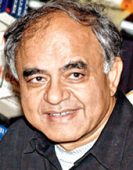
Gurcharan Das
Gurcharan Das’ latest book, Kama: The Riddle of Desire, examines how to cherish desire in order to live a rich, flourishing life. He is the author of two best sellers, The Difficulty of Being Good and India Unbound. His other literary works include a novel, A Fine Family and an anthology, Three Plays. His previous book, India Grows at Night was on the FT’s best books for 2013. He studied philosophy at Harvard University and was CEO, Procter ; Gamble India before he became a full time writer. He is general editor for Penguin’s 15 volume Story of Indian Business.

Harinder Baweja
Harinder Baweja is Editor, Special Projects, Hindustan Times. She has been in journalism for over three decades and is the recipient of several awards, including the Ramnath Goenka Award for investigative journalism. Baweja has focussed on covering conflict, internal security, defence and human rights. She is also the author of a book on Kargil (Kargil: A Soldier’s Diary) and has edited a book on the 26/11 attacks in Mumbai

Ira Mukhoty
Ira Mukhoty is the author of Heroines: Powerful Indian Women of Myth and History, and Daughters of the Sun: Empresses, Queens and Begums of the Mughal Empire. She has two degrees in Natural Sciences and has studied in Delhi and Cambridge. While living in Delhi, one of the oldest continuously inhabited cities in the world, she developed an interest in the evolution of mythology and history and its relevance to the status of women in India. Ira is particularly interested in the way history is manipulated to suit changing narratives and the need to present historical non-fiction in an accessible way. In Daughters of the Sun, she has attempted to reclaim women whose collective memory was tainted by the colonial legacy of India and its complicated relationship with Islam.
She is currently working on her 3rd project, a biography of Akbar the Great.
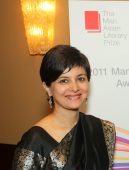
Jahnavi Barua
Jahnavi Barua is a writer based in Bangalore. Her first book, Next Door, a collection of short fiction, was published by Penguin India in 2008 to wide critical acclaim. Her second book, Rebirth, was published in 2010 and was shortlisted for the Man Asian Literary Prize and the Commonwealth Book Prize. She was awarded the Charles Wallace Trust Fellowship for Creative Writing in 2006. Her books are on the syllabi of universities such as Jamia Millia Islamia and Mysore University and her short fiction has been widely anthologized She is currently working on her third book.
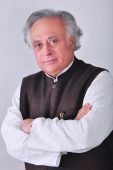
Jairam Ramesh
JAIRAM RAMESH is a member of Parliament since 2004 has been a union minister between 2006 and 2014. He is the author of a number of acclaimed works including Indira Gandhi: A Life in Nature (2017), Old History, New Geography: Bifurcating Andhra Pradesh (2016), To the Brink and Back: India’s 1991 Story (2015), Legislating for Justice: The 2013 Land Acquisition Law (2015) Green Signals: Ecology, Growth and Democracy in India (2015). Making Sense of Chindia: Reflections on China and India (2005) and others, Before becoming a politician, he worked in various capacities in the Government of India including the Prime Minister’s Office, Ministry of Finance, Planning Commission and Ministry of Industry.
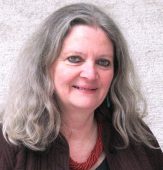
Jutta Jain-Neubauer
Jutta Jain-Neubauer began her pioneering work on the stepwells of Western India in the mid70s resulting in the book The Stepwells of Gujarat in Art-historical Perspective (Delhi, 1980). Since then she has been engaged in research on the cultural responses to water in India’s traditional architecture in the context of the environment and typology; the dynamics with regard to trade histories; the social exclusion and gendered spaces; the ritual and political dominance, and methods of water conservation. In 2016 her edited book Water Design. Environment and Histories was brought out by MARG publications, Mumbai. Jain-Neubauer has been deliberating on various aspects of the topic in numerous articles, lectures and seminar papers over the last four decades.
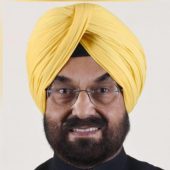
Kanwar Sandhu
Kanwar Sandhu is a former journalist and now a public figure based in Chandigarh.
A journalist with more than 40 years experience, Kanwar was the editor of the North Indian Editions of Indian Express, Hindustan Times, Executive Editor of The Tribune Group of Publications and Managing Editor of Day & Night News TV Channel. He has been a familiar face in Punjab and other conflict areas including J&K.
He is presently a member of the Punjab Legislative Assembly.
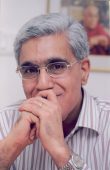
Karan Thapar
Karan Thapar is the only Indian television professional who has worked for ten years in television outside India. Trained as a correspondent, producer, editor and presenter with London Weekend Television in the United Kingdom, where he worked for programmes as varied as Weekend World, The World This Week, The Business Programme, The Walden Interview and Eastern Eye, he has both the most varied and the most in-depth knowledge and experience of television current affairs programme making available in India today.
In 1991, on his return to India, Karan Thapar helped establish H.T. Vision Limited, the first television venture established by the K.K. Birla group, which he headed as Executive Producer. HTV’s flagship programme, Eyewitness, initially launched as a video magazine but which later transferred to Doordarshan as a weekly programme, quickly became a window on current affairs tackling all the major subjects of the day and interviewing every single top politician from the prime minister onwards.
Amongst its remarkable successes were path-breaking interviews with former president R. Venkatraman, former prime ministers of Pakistan, Benazir Bhutto and Moin Quereshi, and the first interview as prime minister from P.V. Narasimha Rao, as well as unique war-front reportage from Afghanistan after the take over of the country by the Mujahideen and in-depth analyses from Kashmir as well as numerous scoops of the armed forces, financial scandals and a variety of social and economic issues.
Under his direction, HTV also launched the first-ever chat show in India called The Chat Show. It ran for a hundred weeks on Doordarshan and is today widely remembered by millions of fans for its relaxed and unique style.
In 1995 Karan Thapar won the Onida Pinnacle Award for Best Current Affairs Presenter for the programme, The Chat Show.
From HTV he moved to Home TV, where he was the Director of Programmes and was responsible for the creation of the channel starting in January 1994, when it was first thought of, through to the designing of its first programme schedule, the channel’s launch in May 1996 and its first year of operation upto May 1997.
While he was Director of Programmes at Home TV he also presented the in-depth weekly interview programme, In Focus with Karan, which was the only programme of its type in India and which became renowned both for his hard and unremitting style as well as for the major national headlines it created each week. Known to viewers as the only TV presenter/interviewer who does not take no for an answer, Karan Thapar’s In Focus was the longest running programme on Home TV. Launched on the channel’s inaugural night it continued each monday without a break for over two years.
In 1998 Karan Thapar was awarded the Videocon Screen Award for Best Current Affairs Presenter for In Focus with Karan.
Also, in 1998 and again in 1999 he was the lead presenter of Doordarshan’s English language three day election results programme called India Decides.
After his stint at Home TV Karan Thapar presented a programme on Star TV called Special Session. Designed as a political debate with one participant from each of the three main political groups in the Indian Parliament, the programme was not just one of the most highly watched on Star Plus but also the most recognised political programme on the channel. Special Session was short-listed for the 1998 Asian Television Award for best presenter.
In 1998 Karan Thapar moved to UTV as its President, News & Current Affairs. Under his supervision UTV made On the Record for DD-2, HARDtalk INDIA/Face to Face for BBC, We the People for Star Plus, The Big Question / The Great Debate for DD-1, Talk Back and Two’s Company for DD News and Line of Fire for SAB TV. In 1999 Karan Thapar won the coveted Asia Television award in the best current affairs presenter category for his work on the programme On the Record. In May 2001 Line of Fire won the RAPA Award for best current affairs programme.
Presently he is head of Infotainment Television (ITV), a television production house making programmes for BBC, Channel NewsAsia, CNBC, CNN-IBN and Doordarshan.
Perhaps the most prestigious programme Karan Thapar has presented is the BBC series of one-to-one political interviews generically called HARDtalk INDIA and modelled on the lines of the BBC’s well known and long standing programme, HARDtalk. Within this series the non-political interviews are called Face to Face. The objective of these interviews is to provide a window for the many vibrant personalities in India and, if possible, in the wider subcontinent. Whilst the political interviews are hard-hitting, the non-political ones are discursive conversations with the intention of understanding the interviewee. The attempt is to draw the person out rather than to make him or her defensive. In July 2001 HARDtalk India won the Best Current Affairs Award at the Indian Television Awards.
Since March 2004 Karan Thapar has presented the highly regarded current affairs programme Tonight at 10 (now re-christened India Tonight) on CNBC. Broadcast four days a week it is today considered India’s premiere current affairs programme. Each night it focuses on a single subject and brings together the top two or three people from different political viewpoints to discuss a single issue.
In January 2006 Karan Thapar launched a primetime sunday night one-to-one current affairs interview Devil’s Advocate on CNN-IBN, a channel jointly launched by CNN and CNBC, where each week he interviews in depth a single leading high profile political personality. Sometimes the guest may be a leading businessman or an author but more often than not it is a political personality. The series began with a double bill with the former President of Pakistan, General Musharraf, which made front page headlines both in India and Pakistan. Since then the programme has interviewed all the top government ministers in India, most of the top leading opposition leaders and several of India’s principal chief ministers from the major states.
There are two interviews which Karan Thapar did in 2000 which achieved world-wide recognition. The first was in February when he interviewed the then Chief Executive of Pakistan, General Pervez Musharraf. This was the first interview given by General Musharraf to an Indian television journalist and it represents the strongest ever cross-examination of a Pakistani head of state from the Indian standpoint. The interview was shown on Doordarshan, India’s national television channel. The programme won the Best Current Affairs Special Award at the Asian Television Awards in December 2000. The second interview, which was part of the BBC HARDtalk INDIA series, was done with India’s World Cup winning former cricket captain Kapil Dev and became instantly famous because Mr. Dev broke down and cried uncontrollably for over ten minutes.
For the first time in the ten-year history of the prestigious Asian Television Awards in December 2003 both the current affairs trophies were won by a single individual. Karan Thapar’s SAB TV programme Court Martial was judged the best current affairs programme. The winning episode was a 40-minute interview with the then Pakistani Foreign Minister Khursheed Kasuri broadcast in June 2003. In the same year the best current affairs presenter award was also given to Karan Thapar for his long-running BBC series Face to Face. The winning episode was an interview with the dancers Radha, Raja and Kaushalya Reddy broadcast in February 2003.
In November 2004 Karan Thapar won the coveted Teachers Award for Communication.
In December 2005, Karan Thapar set a second record at the Asian Television awards when he became the first person to win the Best Current Affairs Presenter trophy on three separate occasions. In December 2005 he won the award for his HARDtalk India interview with India’s former Law Minister and now BJP General Secretary Arun Jaitley.
In December 2007 Karan Thapar broke his own record when he won the Asian Television Award for Best Current Affairs Presenter for a fourth time for Devil’s Advocate, his regular weekly programme on CNN-IBN.
In April 2009 Karan Thapar won the Ramnath Goenka Broadcast Journalist of the Year Award.
In 2009 and again in 2010 Karan Thapar won the Indian News Broadcasting Award for the Best Current Affairs Presenter.
In December 2010 Karan Thapar won the Asian Television Award for the best Current Affairs Presenter, setting a record for winning this award 5 times.
In 2011 Karan Thapar won the News Television Award for Best Current Affairs Presenter.
In 2011 Karan Thapar won the CH Mohammed Koya Award for Excellence in Journalism.
In December 2013 Karan Thapar won the International Press Institute – India Award for Excellence in Journalism.
Before joining London Weekend Television in 1982, Karan Thapar worked for The Times (UK) in which capacity he both served as the newspaper’s West Africa correspondent based in Lagos, Nigeria, and later for a period of seven
years wrote leaders for The Times on the countries of South Asia. Karan Thapar has also written extensively for The Economist and The Spectator and
has widely reported for the BBC, particularly during the fourteen months he spent in Nigeria.
He is presently writing a weekly column for The Hindustan Times called Sunday Sentiments. In January 2006 a collection of Karan Thapar’s Sunday Sentiments columns was published in a book called Sunday Sentiments by the publishing house Wisdom Tree. In October 2009 HarperCollins published a second collection under the title ‘More Salt than Pepper’.
In June 2006 a collection of Karan Thapar’s Face to Face interviews for the BBC was published as a book called Face to Face India by the publishing house Penguin.
Important Distinctions & Awards
- Awarded the Shell UK Television Certificate of Merit in 1986 as Producer of Weekend World’s programme on ‘The Big Bang’
- Award of Merit from British Association of Film & Television Arts (BAFTA)
- Best Chat Show Anchor (Onida Pinnacle Awards) in 1995
- Best Current Affairs Anchor of 1998 (Videocon-Screen awards)
- Best Current Affairs Anchor of 1999 for On the Record (Asian Television Awards)
- Best Current Affairs Special Award for the interview with General Musharraf in December 2000 at the Asian Television Awards.
- RAPA Award for best current affairs programme for Line of Fire in May 2001
- Best Current Affairs Programme Award for HARDtalk India at the Indian Television Awards in July 2001
- Best Current Affairs Programme Award for Court Martial at the Asian Television Awards in December 2003.
- Best presenter award for Face to Face at the Asian Television Awards in December 2003.
- Teachers Achievement Award 2004 for Communication.
- Best current affairs presenter award for HARDtalk India at the Asian Television Awards in December 2005.
- Best current affairs presenter award for Devil’s Advocate at the Asian Television Awards in December 2007.
- Journalist of the Year award for broadcast at The Ramnath Goenka Excellence in Journalism Awards in April 2009.
- News Show Host – English of the Year 2008-09 at The Indian News Broadcasting Awards 2009 and again 2010.
- Best Current Affairs presenter award for Devil’s Advocate at the Asian Television Award in December 2010.
- Best Current Affairs Presenter award – News Television Awards – 2011.
- CH Mohammed Koya Award for Excellence in Journalism, 2011
- International Press Institute – India Award for Excellence in Journalism, 2013
- K. Reddy Memorial Award for excellence in journalism for the year 2017
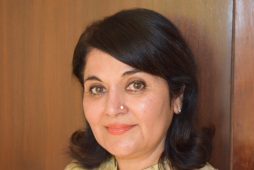
Kishwar Desai
Kishwar Desai is an author and columnist, and the Chair of The Arts And Cultural Heritage Trust that set up the world’s first Partition Museum, at Town Hall, Amritsar. She also helped to set up the statue of Mahatma Gandhi outside Westminster in the UK. Her first novel ‘Witness the Night’ won the Costa First Novel Award in the UK, and her play “Manto!” had won the Omega-TAG award, in India. She worked in television as an anchor/producer for over twenty years before becoming a writer . She is presently working on two historical period plays, as well as a novel based on Indo-British history, and a book on Indian cinema.
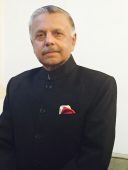
Lt Gen Kamal Davar
Lt Gen Kamal Davar is one of India’s distinguished soldiers and a leading military thinker. A veteran of the 1965 and 1971 ops, was wounded in action in the ’65 ops. As its first DG founded the Defence Intelligence Agency. A prolific writer, he is also involved in Track 2 endeavours abroad and is a member of the High Level Military Group monitoring Israeli operations in the Gaza strip and the West Bank. Also heads a local environmental NGO, the SPOKE.”

Lt Gen Kamal Davar
Lt Gen Kamal Davar is one of India’s distinguished soldiers and a leading military thinker. A veteran of the 1965 and 1971 ops, was wounded in action in the ’65 ops. As its first DG founded the Defence Intelligence Agency. A prolific writer, he is also involved in Track 2 endeavours abroad and is a member of the High Level Military Group monitoring Israeli operations in the Gaza strip and the West Bank. Also heads a local environmental NGO, the SPOKE.”
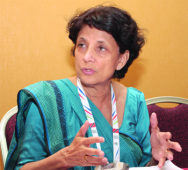
Maja Daruwala
Maja Daruwala is currently Senior Advisor of the Commonwealth Human Rights Initiative (CHRI), having served as its Director for 20years. CHRI is an international NGO mandated to ensure the practical realization of human rights across the Commonwealth. She presently serves on several boards including the International Women’s Health Coalition, the International Records Management Trust, and the Public Affairs Committee. She is an executive committee member of the newly formed Police Foundation, Delhi.
Daruwala has served as chairperson of Minority Rights Group and as chair and co-founder of People’s Watch Tamil Nadu, a group that is particularly focused on ending torture. She is actively engaged in numerous other human rights initiatives and concentrates on issues relating to civil liberties including police reform, prison reform, right to information, discrimination, freedom of expression, and human rights advocacy capacity building. In 2010 she received the Nani A. Palkhivala Award for defending and preserving civil liberties in India.
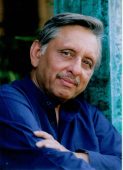
Mani Shankar Aiyar
Mani Shankar Aiyar, was born on 10 April 1941 at Lahore in pre-partition India. He was educated at The Doon School and St. Stephen’s College, Delhi University, where he graduated in B.A. Economics Honours standing first in the University, and subsequently took an M.A. in Economics from Trinity Hall, Cambridge, U.K., which, in 2010, honoured him with an Honorary Fellowship of the College. He started his career with the Indian Foreign Service in 1963, during the course of which he served in Brussels, Hanoi, Baghdad and Karachi, besides various assignments particularly in economic posts, at Headquarters. From 1985 to 1989, he was on deputation to the Office of Prime Minister Rajiv Gandhi, following which he took voluntary retirement and embarked on a second career in politics and the media. He was thrice elected to the Lower House of Parliament from Tamil Nadu (1991, 1999 and 2004) and also served a six-year term in the Upper House (2010-2016) as the President’s nominee. In 2006, he was conferred the Outstanding Parliamentarian Award by the President of India. He served as Minister of Petroleum and Natural Gas from 2004 to 2006, during which short period his contribution was recognized as so significant that the Indian School of Mines created him Doctor of Science Honoris Causa. He served as a Cabinet Minister holding several different portfolios from 2004 till 2009. He has also made a reputation for himself as one of India’s leading columnists and is often seen on television. He has thus far published eight books, including Pakistan Papers and Confessions of a Secular Fundamentalist. He was married in 1973 to Suneet Vir Singh and they have three grown-up married daughters and six grandchildren
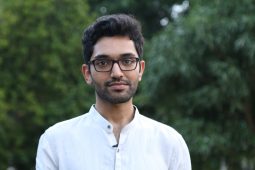
Manu S Pillai
Manu S Pillai is the author of the award-winning The Ivory Throne: Chronicles of the House of Travancore (HarperCollins India, 2015), and Rebel Sultans: The Deccan from Khilji to Shivaji (Juggernaut, 2018). Formerly Chief of Staff to Dr Shashi Tharoor MP, he has in the past worked at the House of Lords in Britain, and with the BBC on their Incarnations history series. Written over six years and researched in three continents, Manu’s first book, The Ivory Throne won the 2017 Sahitya Akademi Yuva Puraskar. Manu is also text contributor to Serena Chopra’s Bhutan Echoes (Tasveer, 2016), and writes a weekly column for Mint Lounge. His other writings have appeared in The Hindu, Open Magazine, The Times of India, Hindustan Times, and other publications.
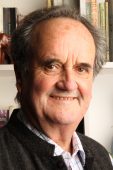
Mark Tully
Mark Tully is a journalist, author and broadcaster based in New Delhi. For over twenty years the BBC’s Delhi correspondent, he still broadcasts a popular weekend programme on BBC Radio 4 called ‘Something Understood’. His non-fiction books include “Amritsar: Mrst Gandhi’s Last Battle’, ‘No Full Stopis in India’, ‘India in Slow Motion’ and ‘Non’Stop India’. He has written two collections of short stories, the lastest being ‘Upcountry Tales’.
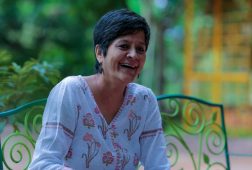
Masooma Jha
Masooma Ranalvi is a Law graduate from Mumbai, India, and a Chevening Scholar, with a Diploma on Women in Leadership and Management, University of Bradford , U K.
She currently works as trainer on issues of gender and sexual harassment. In 2015, she took the bold step to be vocal about her views on the practice on Female Genital Mutilation, and how having been a victim of the practice when she was young, it impacted her deeply and mobilised support to start debate and discussion over the taboo issue in her community.
Since then she has been at the forefront of a wide survivor led campaign in India to end FGM in the community. She has inspired women and young girls across the country of openly speak about their experiences with regard to FGM and to actively engage in a campaign against the practice.

Matrena Martin
Matrena’s phenomenal journey with The Foundation.
Academic qualification – Bachelors in Industrial Art and Design Practices (IADP) (Textiles and
furnishing)
Institution – Srishti Institute of Art Design and Technology, Bangalore
Currently –working in Nicobar Design Studio, New Delhi
In 2007, Matrena Martin, a Nicobarese tribal girl, was one of the six students selected at the end
of a 14-month process, identifying children for a 15-year scholarship. Matrena Martin is one of
the six students selected from Car Nicobar Islands for our Andaman and Nicobar Islands
initiative in 2006 for The Foundation’s REACH scholarship.
Daughter of a government employee and housewife, she was the first ever from Car Nicobar to
leave the Andaman and Nicobar Islands to study. Matrena’s entire village looks up to her hoping
she would make their community a proud- one that the world outside knowing nothing of. Car
Nicobar was washed over in the Tsunami in 2005. 10-year-old then, Matrena remembers the
washing away of her home very vividly, leaving her community to rebuild life in the island.
Car Nicobar is a far-flung, tribal reserve island south of the archipelago; the only way to reach
there is via either ships or via government affiliated air transport. After being selected for the
REACH scholarship, Matrena started her class 6 in Rishi Valley School, Chittoor. Five years at
Rishi Valley School opened up her mind and introduced her to the arts and crafts of various
communities of India.
Matrena, completed her high school from Sophia College, Mumbai building a humanities base
before she went on to pursuing her Bachelors in Industrial Art and Design Practices (IADP) from
Srishti Institute of Art Design and Technology, Bangalore. Matrena graduated this year and did
her Bachelors in Industrial Art and Design Practices, majoring in textiles and furnishing from
Srishti Institute of Art Design and Technology, Bangalore.
In her 11 years with The Foundation, Matrena has grown to be fierce, independent and
purposeful. Her sense of bringing Nicobarese art into contemporary designs has grown stronger.
We look forward to helping Matrena fulfill her dream of opening a design space in the Andaman
& Nicobar Islands to create a platform for many others like to her to come together bridging the
distance through art.
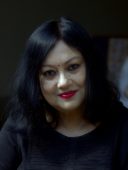
Mitra Phukan
Mitra Phukan is a writer, translator, columnist and a trained classical vocalist who lives in Guwahati, Assam. Her published literary works include four children’s books, a biography, two novels, “The Collector’s Wife” and “A Monsoon of Music”, both published by Penguin-Zubaan, and a collection of fifty of her columns, “Guwahati Gaze”. Her most recent works are a translation of Jyanpeeth Awardee Birendra Kumar Bhattacharjee’s novel, “Kobor aru Phool” , “Blossoms in the Graveyard”, (Niyogi Publications) and a collection of her own short stories, “A Full Night’s Thievery”, (Speaking Tiger) both of which appeared in October 2016. She writes extensively on Indian music as a reviewer and essayist. Her short stories have appeared in various journals worldwide. Her works have been translated into many languages. As a translator herself, she has put across the works of some of the best known contemporary writers of fiction in Asomiya into English. Her column “All Things Considered” in The Assam Tribune is very widely read.
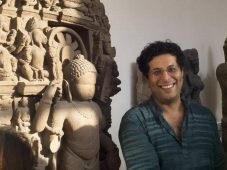
Naman P. Ahuja
Naman P. Ahuja is a curator of Indian art, Professor at Jawaharlal Nehru University and Co-Editor of Marg Publications. Most noted for his critically acclaimed exhibition on The Body in Indian Art and Thought (shown at the Palais des Beaux Arts in Brussels and the National Museum in Delhi in 2013-14), his curatorial work started at the British Museum in 2001, followed by exhibitions at Casa Asia in Barcelona, the Ashmolean in Oxford as well as numerous venues in India where they range in subject matter from antiquities to contemporary art. His studies on terracottas, ivories and small finds have drawn attention to the foundations of Indian iconography and transcultural exchanges at an everyday, quotidian level. Previously, as Fellow at the Ashmolean Museum, Oxford, he authored a comprehensive catalogue of their collections of ancient Indian statuary and archaeological material: The Art & Archaeology of Ancient India (to be published by Oxford, November 2018).
His first co-authored book on Indian art history, Divine Presence: The Art of India and the Himalayas (Casa Asia and Five Continents Editions: Barcelona and Milan, 2003) was translated into Catalan and Spanish. Subsequently, The Making of the Modern Indian Artist-Craftsman: Devi Prasad (Routledge, 2011), provided a case-study of the impact of the Arts and Crafts Movement on India. The Body in Indian Art and Thought (Ludion, Antwerp, 2013) explores a variety of fundamental approaches to what drives people to make images. It was translated into French and Dutch. And, more recently: The Arts and Interiors of Rashtrapati Bhavan: Lutyens and Beyond (Publications Division, Delhi, 2016) examines the changing nature of political and bureaucratic compulsions on the interior design of the home of the first-citizen of India over the past century.
In his latest curatorial venture, leading the Indian half of a team at the CSMVS, Mumbai for the exhibition on India and the World: a history in nine stories (published by Penguin, 2017), he examined the commensurabilities and divergences of the histories of Indians in relation to other civilizations of the world and terms at which globalization can be encountered from an Indian perspective. India and the World, ran from November 2017 to February 2018 at the CSMVS Mumbai and at the National Museum, New Delhi in May and June, 2018.
Prof. Ahuja’s M.A. and M.Phil. classes are concerned with Indian temples, their sculptures and the economies that created them, the development and social-history of Indian iconography, the art of Gandhara and Indian terracottas. He has held Visiting Professorships at the Kunsthistorisches Institut in Florence, the University of Zurich, University of Edmonton in Alberta and continues to lecture regularly at SOAS, his alma mater. He has also been awarded Fellowships by the Getty research Institute and the Nehru Memorial Museum and Library.

Naresh Swami
Born in an aristocratic Brahmin family in the year 1980. Following the tradition of family priesthood responsibilities, he was ordained as temple priest at a very young age. A voracious reader and his burning desire to learn helped him excel in studies, and went on to attain two doctoral degrees in two diverse fields – the first on butterflies, and the second on plants and trees mentioned in the Vedas and Puranas. His patience and love for winged creations brought out thousands of wonderful findings of butterflies from the Nanda Devi biosphere. The priesthood responsibilities made him familiar with most of the Hindu scriptures and helped him reveal the history and significance of plants and trees mentioned in the ancient scriptures. Currently, working in the Himalaya on orchids.
He is a member of Nikon’s elite group – the NPS, author of three books – Terrestrial Orchids (April, 2016), Hidden Treasures: Rare Plants of the Alpine Himalaya (February, 2017) and Orchids of Ziro: Arunachal Pradesh (November, 2018) and creator of a mobile application on orchids – The Orchids of the Eastern Himalaya (September, 2018).
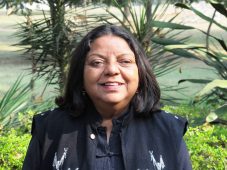
Nirupama Dutt
Nirupama Dutt is a poet, journalist, and translator of many seasons. She writes in both English and Punjabi as well as occasionally in Hindi. Her recent works include the biography of Punjab’s Dalit icon, ‘The Ballad of Bant Singh’ and translation into English of Gulzar’s anthology of poetry, Pluto, published by HarperCollins.She received the Punjabi Akademi Award for her anthology of poems, Ik Nadi Sanwali Jahi (A Stream Somewhat Dark). Her poetry anthologies have also come out in English and Hindi: The Black Woman and Buri Auraton Ki Fehrist Se. Her other books include Stories of the Soil (translation of 41 stories from Punjabi, published by Penguin) Poet of the Revolution (translation of the memoirs and poetry of Lal Singh Dil by Penguin). Books edited by her include Our Voices, an anthology of SAARC poetry, and Half the Sky and Children of the Night, two collections of Pakistani short stories. Her journalistic work is vast and has written thousands of articles, critiques and features over a long career. At present she is writing a Chandigarh novel.
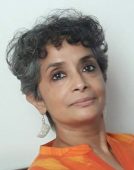
Nivedeta Menon
Nivedita Menon, Professor at Centre for Comparative Politics and Political Theory, Jawaharlal Nehru University, Delhi, is the author of Seeing like a Feminist (2012). Apart from research papers in Indian and international journals, her previous books are Recovering Subversion: Feminist Politics Beyond the Law (2004); and a book co-written with Aditya Nigam Power and Contestation: India after 1989 (2007). She also has two edited volumes Gender and Politics in India (1999) and Sexualities (2007); and a book co-edited with Aditya Nigam and Sanjay Palshikar Critical Studies in Politics. Exploring Sites, Selves, Power (2013).
She is a regular commentator on contemporary issues on the collective blog kafila.online (of which she is one of the founders), and active in democratic politics in India.
She also has translated fiction and non-fiction from Hindi and Malayalam into English, and from Malayalam into Hindi, and received the AK Ramanujan Award for translation instituted by Katha.

Rahul Bose
Described as the ‘Indian art house icon’, by TIME magazine, Rahul Bose won the Best Actor award at the Singapore Film Festival in 2000 for his performance in ‘Split Wide Open’. In 2002, at the Palm Springs Festival, he was awarded the runner-up prize of the John Schlesinger award for Best Debut Director for ‘Everybody Says I’m Fine!’.
Formed in 2006, his NGO, ‘The Foundation’, works with children from underserved areas of India, and his second NGO, HEAL works with survivors of child sexual abuse. In 2009 he was voted the Indian Youth Icon of the Year – Social Justice. In 2010, he was awarded the Green Globe award for his work onclimate change. In 2012 he was awarded NDTV’s Celebrity Sports Activist of the Year. In the same year, on India’s Independence Day, Rahul was conferred the Lt. Governor’s Commendation Award for Services to the Andaman and Nicobar Islands. In 2013 he was awarded the Hakim Khan Sur award for his work towards National Integration. In 2014 , Rahul was named on the Executive Council of the Union Ministry of Home Affairs’ National Foundation for Communal Harmony. In 2015 he was named GQ’s Philanthropist of the Year.
Last year he produced and directed ‘Poorna’ a biopic on the youngest girl in history to climb Mt Everest, for which he was felicitated for Excellence in Direction by the Directors Association of India, received the ‘Equality in Cinema’ award at the Melbourne Film Festival and the Excellence in Cinema award at the Dublin Film Festival. He was GQ’s Man of The Year – Social Change, 2017. A former international rugby player, Rahul represented India for eleven years, retiring from the Indian team in 2009. A prolific speaker, he has lectured on leadership, sport, gender equality and Indian cinema at the World Bank, Harvard, Oxford, Cambridge, Yale, MIT, Columbia and Cornell University amongst others.
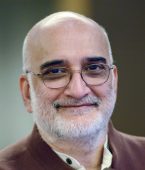
Rajiv Mehrotra
“Rajiv Mehrotra is Secretary and Trustee of The Foundation for Universal Responsibility of HH The Dalai Lama, established with the Noble Prize. He accompanied His Holiness to the ceremony and has been a student of his for nearly forty years. He was also a personal student of Mr. BKS Iyengar over several decades. He moderated an iconic dialogue between His Holiness & Mr. Iyengar – Paths to Happiness and interviewed both of them individually several times on television
Rajiv was educated at St Stephen’s College, Delhi and the Universities of Oxford and Columbia, his nine books published in more than 50 editions & languages include The Essential Dalai Lama, The Dalai Lama, on Life, Living and Happiness. The Spirit of The Muse, The Mind of The Guru, and a biography of Ramakrishna – Thakur. He has been a Judge for the Templeton Prize for Religion and a television anchor in a multi-faceted career.
Rajiv Mehrotra has Directed/Produced more than 650 documentary films with 1700+ festival screenings globally, winning 300+ awards, including 53 national film awards from the President of India.
He serves as Producer & Commissioning Editor of The Public Service Broadcasting Trust. Rajiv has twice addressed plenary sessions at the World Economic Forum at Davos and spoken to diverse audiences around the world.”
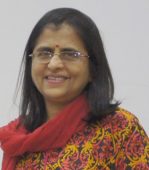
Rajvi H Mehta
Rajvi H Mehta has been a student of Yogacharya BKS Iyengar for 4 decades.
She has been regularly teaching public classes in Mumbai for the Light on Yoga Research Trust since 1986. She has been invited as the lead teacher for the International Iyengar Yoga Conventions in UK, France, Germany, Spain, Belgium, Switzerland, Ireland, China, Israel and conducted workshops in Poland, Philippines, Jordan, Dubai and USA
She is the founder editor of the journal Yoga Rahasya since 1994 – a journal which has subscribers in 40 countries. She has edited the book Yoga for Sports and is currently working on a book on short real life stories of yoga practices under extreme life situations.
Her research on Iyengar Yoga in patients with Parkinson’s Disease has been adjudged one of the six best papers at the Asia Oceania Neuroscience conference, SIngapore. She was the invited speaker at the ESHRE, Munich, Germany.
She has also given many lectures -demonstrations and presentations at various forums such as Universities, Yoga Institutes, Colleges and national and international conferences.
She has been invited by the Press Information Bureau for a live chat and also made a presentation which was streamed on facebook leading to over 75000 views.
She is the advisor to the Ministry of AYUSH for their various programmes.
She is a scientist – a reproductive biologist working in the field of infertility and human in vitro fertilization having attained her doctorate from the Indian Council of Medical Research’s National Institute for Research in Reproduction. And, currently is the academic Consultant to Origio, India and scientific consultant to Trivector Biomed.
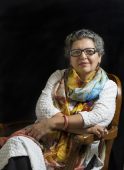
Rana Safvi
Rana Safvi is an author of three books, Where Stones Speak, Tales from Qurana and Hadith, and the Forgotten cities of Delhi. She did a translation of Dastan-e- Ghadar, the tale of mutiny. Safvi’s transaltion of Dastan-E -Ghadar was the first translation of the tale of mutiny as well translation of both volumes of Sir Syed Ahmad Khan ‘s seminal book on Delhi monuments.
She has a Fortnightly column in the Hindu and is a regular contributor to various national print & digital media. .
She is an alumnus of Aligarh Muslim University where she got a degree in medieval history. Rana shares a deep love for history of India. She runs a popular blog, ‘Hazrat e Dilli’, which talks about Delhi’s culture, food, heritage and age-old traditions. She is founder and moderator of #Shair on Twitter, a forum that has revived popular interest in Urdu poetry in a major way.
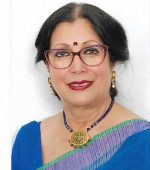
Reba som
Reba Som studied history at Presidency College, Kolkata, standing first class first both in BA and MA examinations, and obtained a PhD from Calcutta University. She was the recipient of the prestigious Jawaharlal Nehru Fellowship in 2000–02. She has served as the regional director of the Rabindranath Tagore Centre, ICCR, Kolkata, from 2008 to 2013. Her publications include Differences within Consensus: The Left-Right Divide in the Congress (Orient Longman, 1995), Subhas Chandra Bose and the Resolution of the Women’s Question (CWDS, 2002), Gandhi, Bose, Nehru and the Making of the Modern Indian Mind (Penguin 2004), Rabindranath Tagore: The Singer and His Song (Penguin, 2009) and Margot: Sister Nivedita of Vivekananda (Penguin Random House, 2017).
Reba Som is a trained singer of Rabindrasangeet and Nazrul Geeti; her compact disc albums, Selected Songs of Rabindranath Tagore (Saregama, 2005) and Love Songs of Kazi Nazrul Islam (Times Music, 2016) also include her English translations of the lyrics.
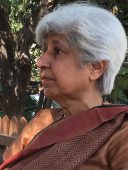
Reena Nanda
Reena Nanda began her writing career with news reports and political biographies for Voice of America in the late sixties after graduating from Delhi University with a First in English Literature. She worked with the British High Commissioner John & Catherine Freeman as a Personal Assistant, arranging tours in India for eminent people like David Frost, John Morris and Julian Trevalyan. Later she worked for the French Ambassador. She is passionately interested in Indian Art & Architecture and has travelled widely to archaeological sites all over India. She joined the Conservation Society Delhi in the course of which she conducted Heritage Walks of Mehrauli, Hauz Khas and Shahjahanabad and published them as a regular feature in the Indian Express Weekend in the late 1980’s. Her first book was a biography of Kamaladevi Chattopadhya published by Oxford University Press (2002) which was commended by Gopalkrishna Gandhi and American feminist scholars Antoinette Burton and Geraldine Forbes. From Quetta to Delhi: A Partition Story(Bloomsbury 2018) is her mother’s account of the Punjabi culture that had existed in Western Punjab before Partition. Her maternal family had migrated from Punjab to Quetta but still maintained ties with their ancestral home. Partition was a final migration, there was no going back. For her, as for other women, displacement was particularly traumatic because for women home was everything, the centre of their life. The book records the psychological suffering and mental breakdowns of the survivors, especially women, that were the result of the huge migrations of Partition.
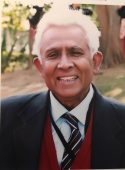
Robin Gupta
Robin Gupta is the author of his best selling memoir ‘And What Remains In The End’ which Khushwant Singh described as ‘ a literary milestone’He as also authored ‘A Bouquet of Thoughts’ published in Lodon in 2002.He has written extensively: books, monographs and articles which are widely acknowledged.His latest book ‘The 70th Milestone, a collection of his poetry will be released on October the First, his 70th birthday..
Robin is a member of the elite IAS and has had the distinction of having served the country in four povinces. He was posted as Commissioner in th field on six separate occasions, itself a record in the history of the ICS/IAS He retired as Financial Commissioner Revenue in th rank of Secretary to the government of India. Robin studied at the renowned and historic Bishop Cotton School,the Stephens college Delhi.He is also an International Scholarship holder who studied at New Trier High School, U.S.A from where he passed out with straight A’s.Robin returned to India imbued with the desire to serve the country. He had a short stint with the Indian Police Service before joining the IAS in 1974. In his preface to ‘A Bouquet of Thoughts’ Khushwant Singh has described Robin, with his consuming desire to promote literature, art and music, in all its aspects, ‘as a Renaissance gentleman’ . Indeed Robin Gupta is a most unusual civil servant who continued to nurse his muse even while having to deal with bone dry files for almost 40 years.On both sides, Robin belongs toan illustrious family. On his mother’s side he is a third generation civil servant. Robin’s father was enrolled as member o the F R C S in 1933 after which he joind the IMS and served the British Indian army under Field Marshal Montgomery’s command in the middle Eastern theater o the second world war.
After his retiremnet, Robin who divides his time between his homes in Panchkula,Delhi and Goa devotes all hi time and energy to promoting the literary movement in India

Sadia Dehlvi
Sadia Dehlvi is a Delhi based author and columnist. For over 40 years her writings have focused on issues of faith, heritage, minorities, and women. Dehlvi has authored Sufism: The Heart of Islam and The Sufi Courtyard: Dargahs of Delhi, both published by HarperCollins India. She is actively engaged in spreading inclusive and pluralistic narratives of Islam. Dehlvi’s recent book, Jasmine and Jinns: Memories and recipes of My Delhi interlaces stories and personal memories of the city. It offers real and lived insights into the life and spirit of Delhi, through its changing customs, manners, cuisines and seasons.
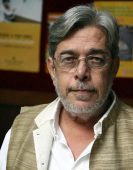
Saeed Akhtar Mirza
Saeed Akhtar Mirza is a celebrated film-maker who has won many national and international awards for his path-breaking work. He is considered one of the founding fathers of the new-wave cinema in India. He has also made numerous documentaries on serious political and economic issues that are of concern across the world. His television serials stretched the boundaries of content on the ‘idiot box’ and became classics.
As a writer, Saeed has written three ‘novels’ that are strikingly different because they combine fiction, documentary, soliloquy, streams of consciousness and tales that finally blend with politics and history to give us a more holistic perception of our times. Saeed is also an essayist, traveller, teacher and thinker.
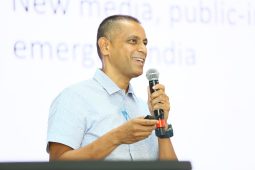
Samar Halarnkar
Samar Halarnkar is the editor of Indiaspend.org and factchecker.in, nonprofits focussed on data-driven, public-interest journalism and fact checking. A journalist for 28 years, his last job was Managing Editor of the Hindustan Times. He holds a master’s degree in journalism from the University of Missouri-Columbia and has been a visiting lecturer at the University of California-Berkeley and a fellow at the Nieman Foundation, Harvard University. He is the author of two books: Nirvana Under the Rain Tree, an early chronicle of India’s Internet revolution; and The Married Man’s Guide To Creative Cooking And Other Dubious Adventures. He writes a column on cooking for Mint and another on national affairs for Scroll.in. He has written columns for the New York Times, the Globe and Mail (Canada) and Hindustan Times
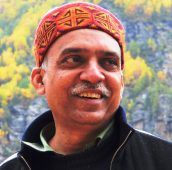
Sanjeeva Pandey
An officer of the Indian Forest Service (1982 batch), Sanjeeva Pandey has served as Director of the Great Himalayan National Park (GHNP) from 1998 to 2006, a prime hotspot of biological diversity in the western Himalayas, India where he engaged himself in biodiversity conservation through livelihood based natural resource management. His efforts with Friends of GHNP have resulted in inscription of GHNP Conservation Area as a World Heritage Site in Doha, the State of Qatar, in June 2014. Originally trained in wildlife management at the Wildlife Institute of India, Dehradun and in forestry management at the Indian Forest College, Dehradun, Sanjeeva also studied Social Sciences (History) at the Jawahar Lal Nehru University, New Delhi. Sanjeeva has travelled to many countries and contributed to numerous training manuals, written peer-reviewed papers, news and media articles and formulated project proposals throughout his professional career. His PhD is on livelihood aspects in support of biological diversity of GHNP.
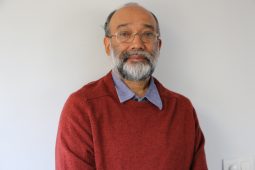
Sanjoy Hazarika
Sanjoy Hazarika, human rights activist, scholar, author, journalist, filmmaker and policy adviser is International
Director of the Commonwealth Human Rights Initiative, an international NGO working on issues relating to human
rights in the Commonwealth. He is also the Founder and Managing Trustee of CNES which runs the pioneering
boat clinics on the Brahmaputra in Assam (www.c-nes.org).
An award-winning journalist, formerly with The New York Times, he is a contributing columnist to various
newspapers and magazines. He was also Consulting Editor with The Statesman and The Sunday Guardian.
Acknowledged as a specialist on issues regarding India’s Northeast and its neighbourhood, and migration,
Hazarika’s latest book is Strangers No More: New Narratives from India’s Northeast, described as ‘the most
comprehensive book yet available about India’s Northeast’ and a ‘captivating analysis of a critically important
area, not only of India, but also of Asia and the wider world’. His first book on the region, Strangers of the Mist:
Tales of war and peace from India’s North East was published to instant acclaim 25 years ago. Other books
include Gender, Poverty and Livelihood in the Eastern Himalayas; Rites of Passage: Border Crossings, Imagined
Homelands, India’s East and Bangladesh; Writing on the Wall, Reflections on the North East.
Hazarika has also made over a dozen documentary films, with a focus on the Northeast, including Rambuai, his
latest on the post-independence uprising in Mizoram, A Measure of Impunity on AFSPA, and A Rivers’ Story –
The Quest for the Brahmaputra. The documentaries deal with a range of issues such as the endangered Gangetic
river dolphin, boat clinics on the Brahmaputra, and the way society, particularly women, cope in conflict
situations.
He appears frequently on television programmes to address issues of rights, advocacy, governance, politics and
the environment relating to the Northeast.
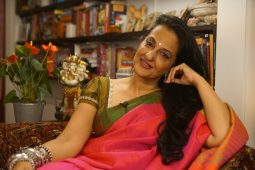
Seema Anand
Dr Seema Anand is a London-based mythologist and a practising storyteller. She lectures on the Kama Sutra and is an acknowledged authority on Eastern Erotology. Her TED talk on ‘The Art of Seduction has been viewed more than 8 million times.
About Book :
The Arts of Seduction by Seema Anand
‘The arts of seduction have never been more desperately needed than today when everyone is in a rush for the instant orgasm. Read Seema Anand’s book. It will tell you how much fun you are actually missing out on.’ – Pritish Nandy
The Arts of Seduction is a guide to sex in the twenty- first century. It seeks to make what has been largely reduced to an act of instant gratification a rather more pleasurable experience. Drawing inspiration from the Kama Sutra, whose groundbreaking attitudes towards sex remain relevant thousands of years after it was first composed, the book delves into numerous techniques and refinements that elevate sex to an altogether different level—whether it is innovative codes for love messages, the effects of applying perfume to different parts of the \body, the many different types of kissing, where and how to massage your lover’s feet or what kind of jewellery to wear during lovemaking. Accessible, sensuous and full of surprises, The Arts of Seduction will forever change the way you think about love and lovemaking.

Shalim M Hussain
Shalim M Hussain is a writer and researcher based in Guwahati and New Delhi. His debut book of poems ‘Betelnut City’ will be published in 2018.

Shashi Tharoor
Dr Shashi Tharoor is an award-winning author of 17 books of fiction and non-fiction, including The Great Indian Novel, Inglorious Empire and the recently published, Why I Am A Hindu. A second-term Member of Parliament representing Thiruvananthapuram, and Chairman of the Parliamentary Standing Committee on External Affairs, he has served as Minister of State for Human Resource Development and for External Affairs in the Government of India.

Shayara Bano
Triple Talaq crusader, Shayara Bano, emerged as the defining persona in the legal battle against the patriarchal custom.
She was the original petitioner in the case after she approached the court in 2016 demanding that the talaq-e-biddat pronounced by her husband be declared as void. She also contended that such unilateral, abrupt and irrevocable form of divorce be declared unconstitutional, arguing that the practice of triple talaq violated the fundamental rights of Muslim women.
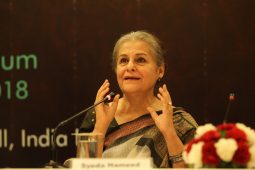
Syeda Hameed
Dr. Syeda Saiyidain Hameed is a former Member of the Planning Com-
mission of India and former Member of the National Commission for
Women. She is a feminist and writer, who is widely recognized for her pas-
sionate engagement in public affairs and social issues, especially for
women, minorities and peace. She is the Founder Trustee of the Khwaja
Ahmed Abbas Memorial Trust, Founder Member of the Muslim Women’s
Forum and a Founder Trustee of the Women’s Initiative for Peace in South
Asia.
MAJOR PUBLICATIONS
Born to be Hanged: The Political Biography of Zulfikar Ali Bhutto, 2018
Gold Dust of Begum Sultans, 2016
Shahkar-e Adab, 2016
Bread Beauty Revolution: Khwaja Ahmad Abbas, 2015
K.G.Saiyidain: A Life in Education, 2015
Maulana Azad, Islam and the Indian National Movement, 2013
Beautiful Country: Stories from Another India, 2012
‘They Hang: 12 Women in My Portrait Gallery, 2006
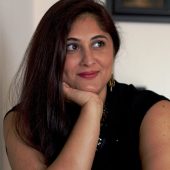
Tara Deshpande
Tara Deshpande Tennebaum actress (Is Raat Ki Subah Nahin, Style, Encounter) Mtv veejay, food writer and photographer is the author of 3 books. Her latest, An Indian Sense of Salad:Eat Raw, Eat More (Penguin 2018)deconstructs classic Indian dishes to their raw form to prepare easy, fresh recipes packed with flavor. Her latest book, a collection of short stories is due next year.
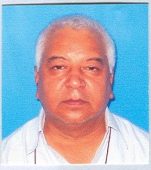
Vinay Tandon
Was born, bred and reared in Simla. Schooled there through the 60s and completed B Sc in 1973. Joined the Indian Forest Service in 1975-76. And retired quietly in March 2012. Much happened in the intervening 36 odd years. Worked for 18 years outside Himachal with two stints with NGOs and one with Government of India, and the rest in the State Forest Department from where I retired as the Principal Chief Conservator of Forests, and prior to that was the Chief Wildlife Warden. Slowly the imperative of Conservation of Nature dawned on me and more and more time and effort went in that direction, though often unsuccessfully. Fortunately, during postings in remote areas of Himachal, I could get to read great literature; of exploration in the Himalayas, its flora, wildlife, tribes and history. Having inherited a love for Urdu from my father, I learnt of the great works of poetry in that language and then ran into the stupendous translation of Shikwa and Jawab-e-Shikwa by the inimitable Khushwant Singh. That was a turning point in my pursuit of literature and made me an avid reader of KS and his Urdu connection. Interestingly, I learnt more about English writing and literature by reading works of the great man. Even as a forester I could somehow connect and begin to explore the twin links between appreciation of Nature and poetry. This quest continues.

Wendell Rodricks
Mumbai born Wendell Rodricks studied Fashion Designing in the USA and France from 1986 to 1988. Wendell’s first collection from Goa earned him the title ‘Guru of Minimalism’ and his next collection in 1995 pioneered the concept of ‘resort wear’ and ‘eco-friendly’ garments at a time the words were not yet coined in India.
A designer with an international presence Wendell has presented his unique garments, inspired by Goa and India, at major fashion events. Rodricks has the honour of being the first Indian designer to be invited to show at the World’s largest garment fair IGEDO in Germany (1995), Dubai Fashion Week (2001), Malaysia Fashion Week (2002), the prestigious Paris Pret-a-Porter salon (2007) and the world’s biggest organic fair BioFach in Nuremberg, Germany (2012). In 2007, the Confederation of Indian Industries invited the designer to showcase two fashion shows in Bryant Park, New York to celebrate the 60th year of India’s Independence. Rodricks has also, shown at Festival of India (1993) in Beijing and Shanghai in China and has shown in Sri Lanka.
Wendell Rodricks was instrumental in planning the first ever Lakme India Fashion Week in 2000 and guiding it in an advisory capacity during its formative years. In 2000, 2003 and again in 2008 he was honoured as the ‘finale’ artist for LFW.
In 2010 Wendell revived the weaving of the traditional Goan Kunbi Sari, a two year project involving identifying and training weavers in the use of sari looms. This unique Kunbi Sari, and other garments using the same weave, were showcased at Wills Lifestyle India Fashion Week. Sari lovers like Sonia Gandhi, Sheila Dixit and Pratibha Patil have bestowed praise on the designer for reviving a dying craft.
In January 2012 Rodricks turned author with Moda Goa – History and Style published by Harper Collins. This book got rave reviews for its portrayal of long forgotten aspects of Goa’s cultural history and costume history. In August 2012 Wendell’s memoir, The Green Room, was published by Rupa Raintree and launched at Lakme Fashion Week. In July 2017, Wendell’s fiction novel “Poskem – Goans in the Shadows’ was published by Om Books. Wendell has written for magazines, coffee table books and anthologies.
In 2014, the designer was awarded India’s fourth highest civilian honour, the Padma Shri by The President of India, Pranab Mukherjee for Art (Fashion Design), honoured by the All India Konkani Parishad, bestowed the Rainbow Warrior Award by Kashish Film Festival and conferred the distinction of Knight in the Order of Arts and Letters (Chevalier de l’Ordre National des Arts et Lettres) by The Ministry of Culture and Communication of France.
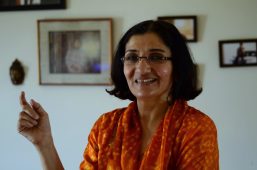
Zakia Soman
Zakia Soman is co-Founder of Bharatiya Muslim Mahila Andolan which strives for muslim womens’ citizenship rights as well as for gender justice in Islam [www.bmmaindia.com]. She is the Founder of Centre for Peace Studies which is engaged in knowledge activism for peace and justice, religious tolerance, pluralism and issues of minorities. She is on the India Core Committee of Saape – South Asian Alliance for Poverty Eradication that engages on issues of poverty regionally across South Asian countries. She received the Outstanding Women Achievers’ award from the National Commission for Women in 2014. She featured in BBC’s 100 Fearless Women [100 Bekhauf Andolankari Auratein] in November, 2015. As petitioner along with her co-Founder, she won the legal case wherein the Bombay High Court ordered women to be allowed entry into the Haji Ali Dargah in a landmark ruling on 26th August 2016. She was petitioner in the triple talaq matter in the Supreme Court and campaigned extensively for its abolition. In its verdict of 22nd August, 2017, the Supreme Court set triple talaq aside as illegal.
She writes regularly in different newspapers and magazines on womens’ issues, secularism, minorities. She has edited a book on dalit muslims, co-edited a volume on peace and justice across South Asia and led four national research studies. In a period spanning over 25 years she has taught at the SJVM College of the Gujarat University, been an editor and a director in a voluntary organization.
Following are some of her publications:
- Zakia Soman & Noorjehan Safia Niaz, Locating Muslim Women in Indian Policy, People on the Margins: Whose Budgets? Whose Rights?: UN Women, New Delhi, 2014
- Noorjehan Safia Niaz & Zakia Soman, Seeking Justice Within Family: A National Study on Muslim Women’s Views on Reforms in Muslim Personal Law, BMMA, Mumbai, 2015
- Zakia Soman & Noorjehan Safia Niaz, No more TalaqTalaqTalaq: Muslim Women Call for a Ban on an UnIslamic Practice, BMMA, New Delhi, 2015
- Zakia Soman & Jimmy Dabhi, editors, Peace and Justice in South Asia, Dorling Kindersley(India) Pvt Ltd, licensees of Pearson Education in South Asia, Delhi, 2010
- Zakia Soman, translator, A Battle for Equity – Masavat ki Jung by Ali Anwar, Indian Social Institute, New Delhi, 2008










